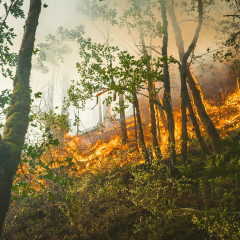Disclaimer: This is an old write-up and the show is now released. Read on then have a watch -- comment your thoughts!
In the age of Greta Thunberg and ‘Extinction Rebellion’, the question of how film and television should communicate the world’s climate concerns is an inevitably important consideration for producers. Are Gen-Z more inclined to listen to a younger voice, such as that of Thunberg? Or are audiences becoming sick of the “preaching” tone that often backs propaganda surrounding environmental detriment?
According to The Fraser Institute, greenhouse gas emissions are forecast to lead to catastrophic irreversible repercussions for the Earth within approximately 10 years, unless society takes immediate action. Therefore, the need to cultivate a mass spike in actionable activism, as opposed to demonstrations of passive participation, is vital.
When thinking about the climate crisis, David Schwimmer – known and beloved for his comedic characterisation of Ross Geller in ‘Friends’ (1995) – likely will not come to mind as the poster-boy of social change. However, Schwimmer is set to star in the US release of dystopian Apple TV series, ‘Extrapolations’ (March 2023), alongside other well known stars, including Meryl Streep and Sienna Miller. The release shall stand as the platform’s latest environmental watch, where climate concerns “preached” by experts within the field have reached fruition.
Extrapolations is set to be an eight-part drama series providing insight into how our world will crumble if we refuse to change humanity, now. Having established an imminent narrative thread of peril, the series executes depicting the state of climate emergency through assigning each episode with a theme – love, work, family – and showcases to an audience how each area becomes impacted due to our ever-damaged environment.
Could the utilisation of “relatable”, well known characters, combined with the bingeability of a drama serial, be Hollywood’s way forward in improving how its media conveys climate issues? Will the inclusion of such stars and genre diversifications serve as a source of reprieve for viewers amidst a heavy-hitting topic, making climate media easier and more appealing to consume?
Matt Lecock, creator of ‘Daybreak’ – a board game about climate change which emphasises collaboration as the key to success – appears to believe that it could be. In a discussion about the game, Lecock noted: “There is an increased public desire to engage with climate change in a tangible way. Often, people don’t want to confront climate change or feel powerless in the face of its complexity.”
So, in transference of this logic, if our television sessions were increased in accessibility, making climate topics easier to digest, then perhaps not only will more people watch the content, but more people will be further inclined to take action, too.
In addition, recent research collected by Climate Feedback – a worldwide network of scientists who seek to sort fact from fiction in climate change media coverage – details how the expression of accurate information is the most vital factor when it comes to any portrayal of climate news. Therefore, to sensationalise the reality at a disregard to true science, would be the more pressing issue as opposed to exactly how information is being delivered – meaning, despite Extrapolations being produced as a drama, permitted it remains non sensationalist, it’s good to go.
Michael Taylor, Senior Research Associate at the University of East Anglia’s School of Environmental Sciences, appeared to second this notion. He says: “I find it interesting and ambitious that actors and actresses with very diverse roles are all being cast in Extrapolations. I hope the series’ plots are able to factually represent our current best scientific understanding of climate change.”
Looking back through the career-history of Schwimmer, Streep and Miller, it’s evident that the Extrapolation’s stars have bounced around different genres. Schwimmer appeared to dabble in some drama (L.A Law, 1986) and crime (Feed the Beast, 2016) on an infrequent basis, but always held a strong tendency towards sitcoms (Intelligence, 2020-21, Curb Your Enthusiasm, 2000, and The Wonder Years, 1988-1993) and lighthearted media (Ratatouille, 2007 and the Madagascar seasons). Streep has explored the screen from within world-known musicals (Mamma Mia!, 2008), fantasy (Death Becomes Her, 1992), and drama (Little Women, 2019). And Miller has built up a diverse repertoire of work, delving into drama (Wander Darkly, 2020, The Private Life of a Modern Woman, 2017, and Mississippi Grind, 2015), comedy (Unfinished Business, 2015), and dual-genre romances (Casanova, 2005, and The Edge of Love, 2008).
These actors and actresses have certainly proven themselves to be adaptable, so why should they not be the ones to take on depicting the climate crisis? Jim Ross, editor of TAKE ONE Cinema magazine believes that stars who have featured in varying roles can offer an insightful, fresh perspective on societal issues. He says: “The best actors and actresses can make the transition to other genres and do really well.”
In relation to transitioning from a genre niche, such as Schwimmer’s strength in sit-coms, into a series covering climate concerns, Ross noted: “One of comedy’s strongest aspects is the ability to show absurdities and hypocrisies, and potentially ridicule them. Humour is just another way of pushing for social change.”
So perhaps it’s time to take down our posters. Get off of that upturned box and place down the megaphone. For years we have witnessed protests, instances of vandalism in the name of “making a point”, and endless rambles about the importance of recycling. Maybe instead of trying to force people to listen to climate concerns, through the use of engaging, enjoyable-to-watch media, producers can make people want to listen.
Yes, there have been television shows and films released about climate change or extended issues surrounding it before – The Uninhabitable Earth (2021) explores the consequences of over-fishing the Earth’s oceans, and there have been numerous docu-style pieces added to Netflix in recent years. But that’s just that – so much of climate media coverage remains restricted within the confines of documentary form: a show-and-tell dynamic of storytelling.
There is hope for Extrapolations in becoming a series that brings the climate crisis into light in ways it has never seen before. It could break the mould through its step away from sit-back-and-watch, instead inviting viewers into a lived experience of what their world is estimated to become.
With its strong casting, and even stronger messaging, climate activists can only hope that in its execution, the risk of being over-dramatised will not overshadow the gravity of their cause and intentions:
“We wish we had the capacity to answer each and everyone’s queries but we must focus our efforts on the climate crisis in an attempt to halt mass extinction and minimise the risk of social collapse. All the best with your climate research, though!” (Cynthia, Extinction Rebellion volunteer).








0 Comments